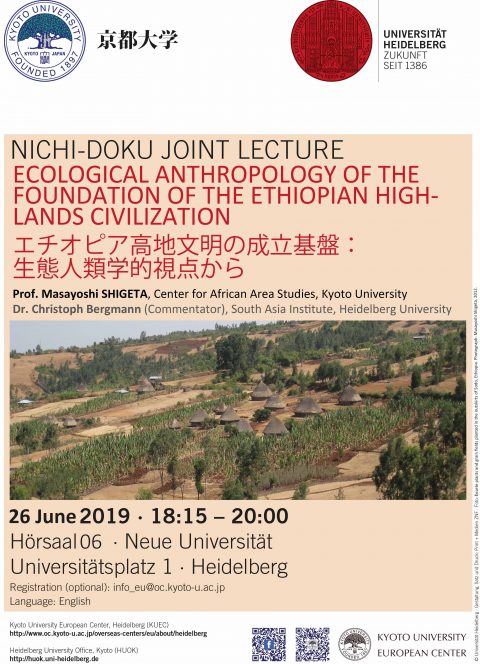 |
Lecturer: Prof. Masayoshi SHIGETA
Commentator: Dr. Christoph Bergmann
Date: 26 June 2019, 18:15–20:00 (Reception 18.00–) Venue: Hörsaal 06, Neue Universität Address: Universitätsplatz 1, Heidelberg |
Abstract
All dynasties that have prospered in Ethiopia have arisen in the highlands, around 2,500 meters above sea level, from the D’mt kingdom that arose around 3,000 years ago to the last emperor, Haile Selassie I (1892–1975), who died in Addis Ababa. As many have noted, the highlands may have been the site of the center of power in Ethiopia because they were easy to defend against external aggressors, such as lowland groups; their cool or even cold climate was comfortable and hosted fewer pests to humans and livestock; they possessed rich forests whose resources were used for construction and fuel; they could host cultivated plants that were adapted to highland climates (such as barley, oats, fava beans, peas, flaxes, and Abyssinian mustard); and they had plentiful water, relative to the lowlands. However, it is interesting to note that, among the above factors, major food plants of Ethiopian origin, such as tef, enset, and coffee, which supported city livelihoods, were produced at relatively low altitudes and transported to the highlands. In this talk, I contend that for the importance of the lowlands that surround high-altitude civilization, using ecological–anthropological observations. Discussion of Ethiopian highland civilization must include ecology, livelihoods and production, governing power and land systems, and trade and means of transportation.
Report
Schedule
| 18:15 |
Welcoming Address |
|
18:20
|
Lecture “Ecological Anthropology of the Foundation of the Ethiopian Highlands Civilization” Prof. Masayoshi SHIGETA
|
|
19:10
|
Commentary Dr. Christoph Bergmann |
| 19:30 | Discussion |
| 20:00 | Closing |
Registration & Contact
Please send us an e-mail containing your name and affiliated organization to the following address:
Kyoto University European Center
Email: info_eu@oc.kyoto-u.ac.jp
Tel: +49-(0)6221-54-30034
The registration is not required, but we would be thankful if you did.
Profiles
Prof. Masayoshi SHIGETA
Center for African Area Studies, Kyoto University
Prof. Shigeta has been examining problems in African agriculture from the standpoint of human-plant relationships (agricultural science, anthropology, ecology, crop evolution, ethnobotany, and domestication studies). Mainly working in Ethiopia, he is also tackling problems of community development through analysis of useful plants cultivated by African people as their cultural resources and folk knowledge associated with it. Since 2016, he has served as Deputy Executive Vice-President for International Affairs, Director of Center for African Area Studies, and Chair of Interdisciplinary Unit for African Studies.
Dr. Christoph Bergmann
South Asia Institute, Heidelberg University
Christoph Bergmann is a lecturer in Geography at the South Asia Institute of Heidelberg University. He received his Ph.D. in Sociocultural Anthropology with a dissertation on trade relationships, ethnic identities and mobile livelihoods in the high mountain border triangle between India, China and Nepal. He subsequently conducted several projects in sub-Saharan Africa, focusing particularly on the strategic positioning by marginalized communities within broader processes of cultural, economic, environmental and political change. As a National Geographic Explorer, Christoph currently builds on his cross-regional expertise and scholarly engagement with processes of (de-)marginalization to investigate a little-noticed but dynamic form of contemporary migration, namely of young and aspiring Africans moving to South Asia for higher education.
* The lecture series “Nichi-Doku Joint Lecture” is organized in close cooperation of the Kyoto University European Center, Heidelberg , and the Heidelberg University Office, Kyoto, the liaison offices of both universities in Japan and Germany. It aims at promoting and strengthening research exchange between Heidelberg University and Kyoto University.


